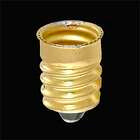How to select the correct socket for your lamp
How to select the correct incandescent socket replacement:
Since the development of the light bulb in the late 1890's, little has changed to the basic form of the sockets. There are slight variations in the sockets as discussed below.
By reading through the following description categories (Sizes, Styles, and Materials) you may identify the size, style and material of a replacement incandescent socket for your lamp.
Sizes
Standard:

|
Commonly known as the Edison Base, standard sockets are used for a variety of applications from table lamps, ceiling fixtures, floor lamps, and some chandeliers. |
Standard base sockets have an approximate inside diameter opening of 1 inch.
Candelabra: |
Common among most decorative fixtures with multiple bulbs, candelabra is smaller than the standard sockets and the bulb selection is more decorative as well. |
Candelabra base sockets have an approximate inside diameter opening of 7/16 inches.
Intermediate:| Slightly larger than the candelabra and smaller than standard, the intermediate size socket is fairly uncommon. An intermediate socket maybe found in a lamp from Europe, Central America, or Asia. |
Intermediate base sockets have an approximate inside diameter opening of 5/8 inches.
French:| Larger than candelabra, the French size sockets are originally from France and require a French size bulb. These sockets are typical among decorative lamps from France. |
French base sockets have an approximate inside opening diameter of 9/16 inches.
Mogul: |
Largest among the residential light sockets, the Mogul size socket is used exclusively for reflector style floor lamps and requires a Mogul size bulb. These sockets should not be used on chandeliers or any residential hanging or decorative fixtures. |
Mogul base sockets have an approximate inside diameter opening of 1 and 9/16 inches.
Adapters:| If a lamp currently has an unfavorable socket size, an adapter can easily change the socket to accept another bulb size. Where a lamp has an uncommon size socket (intermediate or French) adapting the socket will allow you to use more common candelabra size bulbs. |
 |
 |
 |
 |
| Standard to Candelabra | Intermediate to Candelabra | Candelabra to Standard | French to Candelabra |
We also carry halogen replacement sockets.
Halogen:
| Used with Halogen bulbs, the Halogen sockets are relatively new to the lighting world. Halogen sockets are used in areas where high intensity light is needed (i.e. jewelry shops, display cases, flood lighting, and kitchen lights). |
Styles
 |
Keyless:These sockets do not have a switch built in and require the lamp to have a switch in the cord or a wall switch. Keyless sockets are best for hanging fixture where the light is on a wall mounted switch. Example: Item 48001 |
| Standard: Standard keyless sockets can either be in a shell or have a hickey for a candle cover. | |
| Candelabra: For chandeliers and other decorative lighting, keyless candelabra sockets come in a variety of styles. Most common are the candle base and adjustable candle base sockets that allow for candle cover to be placed over the socket. | |
 |
Turn Knob or Keyed: These sockets are more traditional with a turn style on/off key on the side. Keys are typically attached to the same size shaft and can be changed or extended. Changing the key of a socket can make a subtle yet impressive change to the appearance of the socket. Example: Item 48022 |
 |
Push-thru: These sockets have a plastic shaft placed through the socket for turning the lamp on/off. While the push-thru is a hardy design with minimal failure, the shaft itself cannot be replaced. Example: Item 48041A |
 |
Pull Chain: Common for table and floor lamps, the pull chain socket contains a chain on the side for on/off function of the lamp. Chains can vary in length and design to match the lamp. Example: Item 48010 |
 |
Dimmer: A dimmer turn knob socket allows the brightness of the bulb to be adjusted variably. Example: Item 40120 |
 |
Three way: The three way turn knob socket allows a bulb to burn in three positions: Hi, Lo, and Off. Example: Item 40252 |
 |
Three Terminals:A three terminal socket allows two sockets to be wired together and work on the same switch. Both sockets must be three terminal and one socket must be keyed. Turning the key allows three lighting options: Off, Both On, Keyed On with Keyless Off. Gone-With-The-Wind lamps are a common application of three terminal sockets where there is a bulb in the burner and in the font. Example: Item 40251 |
Materials
Interior Screw Shell:
Aluminum: Aluminum is the most common and cost effective material for the socket interior.
Copper: Copper is an alternative to Aluminum where the fixture is exposed to weather. Porch fixtures should use sockets with copper screw shell and porcelain body.
Exterior Cap and Shell:
Brass: Brass is the most common materials in a socket shell. There are different finishes in the brass shell like; polished (shiny), antique, and unfinished
Brass plated: Brass plated shells are similar to the brass shells in appearance with a cheaper price. A brass plated shell comes with similar finishes to the solid brass shell.
Nickel plated: Shiny silver finish.
Bakelite/Phenolic: These socket shells are thick black plastic and are typically found in less expensive lighting where the sockets are hidden by the lamp body.
